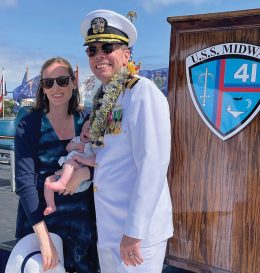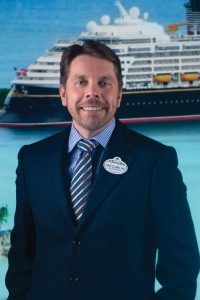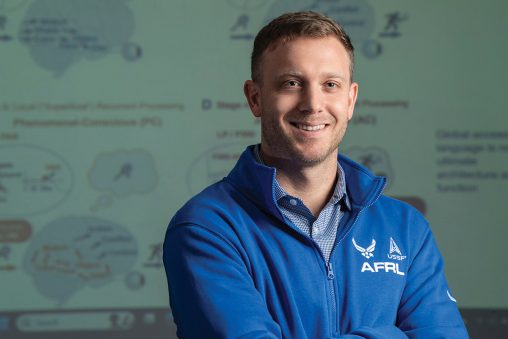Max Clark ’04
Max Clark is a person who believes that everything happens for a reason. He believes in serendipity, in reading the signs to follow the next step in front of you, even if you don’t know exactly where it might lead.
In fact, this life philosophy is what the 49-year-old Wright State Boonshoft School of Medicine 2004 grad credits for getting him to where he is today: chief physician of Disney Cruise Line.
It seems like his path to Disney was destined all along, even if the route to get there was circuitous at times.
Ohio background, wanderlust spirit
While Clark spent his high school years in Beavercreek, he was born in California at Travis Air Force Base (his dad is an Air Force physician), and grew up in Ogden, Utah; Cherry Hill, New Jersey; and Biloxi, Mississippi. “That was all before I started third grade,” he said. “My parents loved to travel overseas, too, and they planted a travel bug in me as well.”
He originally chose Miami University for undergrad, expected to study economics. “Growing up, I preferred social studies—history and geography—and did not expect to pursue medicine,” he said.
One memorable class at Miami clued him in to his potential future in medicine: A human physiology professor noticed his talent and encouraged him to pursue medicine. “In the back of my mind, I always thought medicine was interesting, of course, because, after all, I grew up around it,” he said.
While he has always been a natural student, it was at Miami where he first felt that existential “where do I belong” feeling. “It was a really good school, but socially it wasn’t the right fit for me,” he recalled. “It’s frat-heavy, and I’m the antithesis of a frat guy. I just wasn’t finding my place.”
Returning to Beavercreek, he decided to continue his collegiate education at Wright State, which was a familiar stomping ground (his dad is associate professor emeritus of medicine).
Going back to his “hometown” college suited him. For one thing, as a self-described night owl, he enjoyed the flexibility of the university’s night classes. And with a built-in social network of high school friends already attending Wright State, it felt more at home for him.
Still, he carried around that niggling feeling of wondering where he belonged.
“I was still figuring out who I was and where my place was in the world,” he said. As his med school peers started choosing their specialties, the only thing he knew for certain was that he wasn’t ready to start a practice. “I didn’t know where I fit in with medicine,” he said. “Frankly, I was starting to panic.”
Then, he found a perfect solution that allowed him to practice general medicine and gave him an opportunity to explore the world: He enlisted in the Navy.
A 20-year odyssey leads him home
 Clark’s first stop in the Navy was San Diego, which had a “meant to be” factor. “It felt like it turned out the way it was supposed to be,” he said. “I met some amazing people and made lifelong friends.”
Clark’s first stop in the Navy was San Diego, which had a “meant to be” factor. “It felt like it turned out the way it was supposed to be,” he said. “I met some amazing people and made lifelong friends.”
The Navy certainly allowed him to fulfill his wanderlust dreams. In addition to San Diego, he has been stationed in Key West, Hawaii, Japan, Bethesda, Maryland, and Oceanside, California.
Clark would go on to have a 20-year Naval career, adding a master’s degree in health systems and administration at Georgetown and a master’s degree in public health as part of his residency in preventive health through the Uniformed Services University.
He considers the height of his 20-year Naval career to be the time he spent with health policy in the Naval Headquarters. “I got to work with very impressive leaders,” said Clark, who was tasked with drafting the Navy’s transgender policy under President Obama.
On paper, it seems like he had done it all. Yet all this time, there was one more experience that had eluded him: He wanted to work for Disney.
Next stop: Disney
“We were Disney freaks,” Clark recounts, speaking of himself and his high school friend Steve Hankins (also a Wright State grad, 1999 with a bachelor’s degree in accountancy). “We were obsessed with working in their college program, and didn’t care if we sold T-shirts, we just wanted to work there.”
While his Disney dreams were put on hold as his medical and military career took off, the desire to work at Disney was still in the back of his mind. He even worked part time for two years as an occupational medicine physician at Disneyland while stationed in California.
Then, last year, everything seemed to align at once. Just as he was retiring from a 20-year Naval career, Disney Cruise Lines was expanding and they were looking to bring a medical director in-house.
“2024 was a banner year for me,” he said. “I retired after a 20-year career, moved across country to Disney HQ in Orlando, and had a child,” he said of son Samson with wife Jennifer.
His job at Disney entails leading the shipboard medical teams and providing clinical oversight of patient care. “Every day is a new challenge; the people, the conditions, and external factors are always changing,” he said.
There have already been moments of drama on the high seas. Clark was on board the Disney Treasure when it was summoned 230 miles off the coast of Bermuda to assist a sinking catamaran in November 2024. “It was exciting to see the crew respond and to see how well trained they are to respond to emergencies, so the best thing I could do was get out of the way.”
Speaking with Clark, it’s clear that he takes the Disney magic seriously—and that he’s found his true calling. “I may be biased, but I do think Disney Cruises does the best job of creating the ‘Disney Bubble’ and providing that Disney magic, even during a medical experience.”
Kevin Schmidt ’11
Artificial intelligence algorithms that fly F-16 fighter jets and autonomous systems delivering critical medical supplies in combat zones are among the cutting-edge technologies being developed by a Wright State University graduate whose journey began in Hamilton Hall.
Kevin Schmidt, Ph.D., now a senior neuroscientist on the Air Force Research Laboratory’s Autonomy Capability Team 3 based at Wright-Patterson Air Force Base, credits his success to the foundation built during his time at Wright State.
While pursuing his behavioral neuroscience degree at Wright State, Schmidt found more than just academic achievement — he discovered a supportive community and crucial mentorship that would shape his future.
He worked particularly closely with behavioral neuroscience professors Dragana Claflin, Ph.D., his honors thesis advisor, and Patricia Schiml, Ph.D., and Michael Hennessy, Ph.D. Schmidt also has fond memories of psychology professors Herbert Colle, Ph.D., and Martin Gooden, Ph.D.
“It is a blessing to have people like that in your life. They were good to me,” Schmidt said. “Now, I mentor others and enjoy it. I certainly appreciate those who did it for me.”
The hands-on research experiences at Wright State proved invaluable for Schmidt’s development. He recalled collaborating with Hennessy and Schiml on a study examining factors that reduce stress in sheltered dogs, one of his first formal research experiences.
Today, though stationed in New Haven, Connecticut, Schmidt maintains strong ties to the Dayton region through his work with AFRL and Wright-Patterson Air Force Base, keeping him connected to his alma mater.
His work sits at the intersection of artificial intelligence and human performance. As part of the Autonomy Capability Team 3 (ACT 3), considered the Air Force Research Lab’s premier artificial intelligence research team, Schmidt helps develop technologies that will define the future of both the Air Force and Space Force.
“There are tools that are needed and lives can be saved right now,” he said. “The big thrust now is how these AI tools can assist medical decision making and logistics. But there is also a longer-term aspect of these tools that we are envisioning for the next generation of AI. There is certainly a great deal to delve into right now.”
Through Autonomous Air Combat Operations, ACT3 develops algorithms that control F-16 aircraft autonomously. ACT3 also oversees a space program that integrates measures of human performance. Another critical project involves autonomous aerial refueling, delivering fuel at the right time and location.
“The same algorithms that are used for aerial refueling can be used for medical resupply. So, it comes down to developing algorithms that scale across mission areas,” he said.
When Schmidt gets a break from the lab, he is an avid rock and mountain climber, an interest first kindled during his time at Wright State.
“I grew up in Cincinnati doing it here and there, and then Wright State has a rock-climbing wall. I really got into it there,” Schmidt said. “I started visiting Red River Gorge in Kentucky, and it was a natural evolution into mountain and glacier-style climbing. My interest has just continued to grow through the years.”
As Schmidt continues to push boundaries in his professional work, he remains deeply connected to the institution that helped launch his career.
“I go the extra mile for Wright State because I am thankful for the people there and my experience,” he said. “That is where my career started.”
Class notes
Share your success with fellow alumni. Submit your class notes and updates at wrightstatealumni.com/classnotes.
This article was originally published in the 2025 issue of the Wright State Magazine. Read more stories at wright.edu/magazine.



 Walking through open doors
Walking through open doors  Adventures await
Adventures await  Wright State to expand nursing facilities to meet workforce needs and prepare more graduates for in-demand careers
Wright State to expand nursing facilities to meet workforce needs and prepare more graduates for in-demand careers  Wright State student-athletes make a lasting impact on local family with more to come
Wright State student-athletes make a lasting impact on local family with more to come  Wright State names Rajneesh Suri dean of Raj Soin College of Business
Wright State names Rajneesh Suri dean of Raj Soin College of Business 